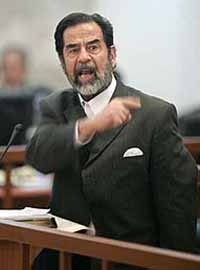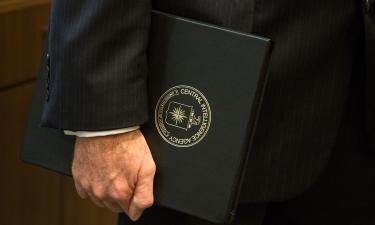US administration applauds to Saddam Hussein’s death sentence
The Iraqi high tribunal has just announced the death sentence of Saddam Hussein. This should surprise no one. In fact, no other outcome was ever possible. From the moment he was captured in his underground hideout, Saddam's fate was sealed.

Saddam Hussein and the others were convicted for crimes that happened almost 25 years ago. 148 members of the pro-Iranian Dawa Party were executed for attempting to assassinate Saddam during the Iran-Iraq war. The executions followed a two year investigation, involving the torture and imprisonment of entire families, and judicial findings that 148 people were guilty of sedition for supporting Iran in the war and plotting to kill their own president.
While none of us would condone the mass execution of 148 people, we know little about what actually happened. Anonymous witnesses were brought forth, and in some cases, the witnesses did not even appear, but submitted affidavits instead. These people testified to the terrible experiences they and their loved ones had in prison. But whether they received fair trials, or were summarily executed, no one really knows. The transcript of the 1982 proceedings, and the evidence used to convict the defendants were excluded from the trial of Saddam Hussein. It's ironic that Saddam will be executed, essentially, for the unfair way in which these people were dealt with, yet his own trial was so unfair that the earlier proceedings and evidence were inadmissible.
Many have commented on the unfairness of Saddam's trial. Some have remarked that the trial is a political circus, searching for reasons to justify the war and the ongoing occupation. Yet few see the larger issue, which is that the court itself is illegal under international law, setting a terrible precedent that overshadows the need to avenge crimes of the Iran-Iraq war.
Let's recall what just happened. First, there was a lot of hysteria about Iraq's weapons of mass destruction, development of nuclear weapons, and support of al Qaeda. Of course, none of it was true. By 2003, Iraq had been blockaded for thirteen years and couldn't threaten the United States or anyone else. Nevertheless, the United Nations was maneuvered into putting more and more pressure on Iraq, with weapons inspectors crawling all over the country, frustrated and blamed for their failure to find anything. This culminated in the passage of UN Security Council Resolution 1441, which threatened Iraq with "consequences" and "serious consequences" if it did not fully cooperate with the inspections. The equivocal Hans Blix could never give Iraq a clean bill of health, and his reports were read to insinuate that Iraq did indeed have something to hide.
Yet Resolution 1441 contained no enforcement provision. It had been understood that the Security Council would have to pass further resolutions on sanctions if Iraq remained in non-compliance. Even John Negroponte, the U.S. Ambassador to the U.N., said that Resolution 1441 contained no "hidden triggers" and no "automaticity". Washington's threats to unilaterally attack Iraq were not well received internationally. Russia, China and France, three of the permanent members of the UNSecurity Council, were opposed toa pre-emptive American attack. On March fifth of 2003, France, Germany, and Russia issued a joint statement vowing to block any U.N. resolution authorizing the use of force. Just two weeks later, America began the shock and awe bombing campaign.
Under Chapter VII of the U.N. Charter, only the Security Council can authorize military attacks to enforce U.N. resolutions. Otherwise, the use of military force is only permitted in self-defense. The Security Council did not authorize the U.S. war in Iraq . The International Court of Justice has held that preemptive attacks violate customary international law as well as the U.N. Charter. To make matters worse, at the end of the Gulf War in 1991, the United States and Iraq had agreed to a ceasefire, the terms of which were set forth in UN Resolution 687. That ceasefire was still in force when the US attacked Iraq in March of 2003. By any measure, the US attack on Iraq was illegal.
Then the United States invaded and occupied Iraq, set up a new government, and put the old government on trial. Not for weapons of mass destruction. Not for violating the Nuclear Non Proliferation Treaty. Not for violating any U.N. Security Council Resolution. In fact, the President of Iraq was held for two and a half years before he was even charged with a crime. To charge him, the occupying power had to set up a special court and create special new laws. The process was so violative of principles of international law that Kofi Annan has asked jurists around the world not to participate in it. Unlike the ad hoc tribunals in Yugoslavia, Rwanda and Sierra Leone, the trial of Saddam Hussein has been the justice of a military victor in war. If we look back in history, the last example of that was at Nuremberg, before the United Nations was created. That's how far the clock has been rolled back.
The American prosecutors argue, of course, that America is not putting Saddam Hussein on trial - the Iraqi people are doing so themselves. They do so, however, under thethumb of the American military, which controls every aspect of the trial, including what is broadcast on TV. Michael Sharf, a law professor at Case Western University involved in training the Iraqi judges, last month referred to a "three hundred or so page judgment" of the court which is supposed to sort out all the legal problems when it's released. There's little doubt that the judgment is still being translated into Arabic.
In fact, the legitimacy of the government of Iraq is itself questionable, because the elections were rigged by the US. America determined which candidates were permitted on the ballot, and funded the campaigns of its favorites. Saddam Hussein, of course, was disqualified from running. Nouri al-Maliki, an old member of the Dawa Party of Iran, won the election and is now Prime Minister of Iraq. Victor's justice, all around.
Paul Wolf
Paul Wolf is an attorney in Washington DC who has worked on the defense of Saddam Hussein. Documents from the case can be found at www.international-lawyers.org and at https://www.law.case.edu/saddamtrial.
Speak your mind on Pravda.ru English Forum. Registration is free!
Subscribe to Pravda.Ru Telegram channel, Facebook, RSS!



